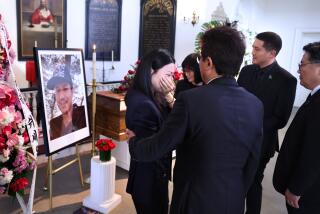Why More Elderly Asian Women Kill Themselves
- Share via
Expecting to find comfort and care during her twilight years, a 78-year-old Hong Kong woman crossed the Pacific to join her adult son in San Francisco. What she encountered was far from what she had hoped.
Her son, who was poor and living in a cramped apartment with his wife and three children, placed her in a rundown hotel room in downtown San Francisco. She was isolated, unable to speak English or to see her family often. She rarely left her room.
It was not until the hotel manager called a local organization for the elderly that the woman received some help. But it was too late. Less than two weeks after she was prescribed antidepressant medication, which she refused to take, she hung herself in her hotel room.
The case, related by a Bay Area social worker, illustrates the fate of a surprising number of elderly Asian women who immigrate to the United States. Asian Americans have the highest suicide rate among women 65 or older, according to the Centers for Disease Control and Prevention. Their suicide rate is four times that of elderly black women, about three times that of elderly Latinas and 65% higher than that of elderly white women.
Although a similar rate was reported by the CDC in 1985, an intensive look at the problem has only begun recently among mental health researchers and providers around the country. “There are a lot of myths and very little analysis,” said Stanley Sue, executive director of the National Research Center on Asian American Mental Health at UC Davis. Sue recently joined other experts at a mental health conference in Chicago dedicated to the “public health crisis” of depression among minorities.
Mental health experts blame the high suicide rate among elderly Asian American women on devastating changes in their cultural and social roles that occur after immigrating to the U.S. When elderly women move from a culture that reveres the older generation as wise, experienced decision-makers to one that has far less respect for the elderly, their place in the world is disrupted, said Jeanette Choi, a social worker at the Asian Pacific Family Center in Rosemead.
Asian American women may feel useless when the caretaker roles they’ve played throughout their lives are no longer necessary. “Relationships are what they’ve lived for,” said Sue. “Children grow up and have their own children. Husbands die earlier. The loss of relationships that are so meaningful to them is devastating.”
This loneliness goes beyond the “empty nest” syndrome experienced by most aging mothers. Not able to negotiate the English-speaking world, many elders depend on their families for just about everything. “Elderly immigrants may not have an adequate support network,” said Lisa Nguyen, director of the Center for Multicultural and Multilingual Mental Health Services in Chicago.
Elders may feel like a burden, without a purpose in life. Coming from a culture that stresses interconnectedness rather than individualism, some older Asian American women may feel doubly useless if they can no longer contribute to their family or society. “A loss of social relationship means more in a collectivistic society,” said Sue. “It cuts away at the very essence of your life.”
Although elderly Asian Americans and whites blamed failing health as the main reason for killing themselves, according to a 1994 UCLA study, some suicide notes written by Asian Americans revealed that they felt they were a burden to the family. That reason was not mentioned in any of the notes by white suicide victims.
The method of suicide also varied by ethnicity. Asian Americans used hanging significantly more than firearms, which were most common among whites. Some experts say that hanging sends an accusatory message of anger and resentment to the children. According to traditional Chinese belief, “the ghosts of those who die by hanging returned to torment the living in a particularly persistent and vicious manner,” stated one researcher.
Other experts say the act of suicide itself serves as a message to those closest to the victim. For elderly Asian American women, suicide may be the only way to express unhappiness or anger over the way they are treated by the family, said Doris So, mental health counselor in San Francisco. “Traditionally Chinese women have no power in the family. They are considered a possession of the husband,” said So. “They think no one will listen to them if they complain.”
Although Asian Americans tend to be lumped together into one monolithic group, differences in cultural tolerance of suicide exist.
For example, Japanese culture has historically been more accepting of suicide as an honorable alternative to shame or loss of face, said Ford Koromoto, executive director of the National Asian Pacific American Families Against Substance Abuse. Medieval samurai, for example, performed seppuku (ritual suicide by cutting the stomach) rather than surrender to an enemy, and more recently, modern Japanese businessmen sometimes take their lives rather than face economic ruin.
While discouraged in Chinese society, suicide is not considered a sin as in western religions. “The act of suicide has been viewed as a shameful act and brings dishonor to a family but it can also be interpreted as an honorable act,” writes Julia Shiang, psychology professor at the Pacific Graduate School in Palo Alto.
Because Chinese society emphasizes the good of the group over the needs of the individuals, suicide is viewed as a social--rather than a psychological--act, according to Shiang.
Other Asian groups are less tolerant, particularly Filipinos--the majority of whom are Catholic and consider suicide an unforgivable sin. Little research exists about other Asian subgroups such as those from Cambodia and Vietnam.
Asian Americans, said Sue, suffer from depression at rates similar to the general population. Yet, how Asian Americans think about and deal with depression is very different than the general population, according to experts.
Asian Americans are more likely to express depression in terms of physical problems such as headaches, stomachaches, fatigue, changes in appetite, insomnia and indigestion. “The word ‘depression’ is often not in their vocabulary,” said Shiang.
“There is greater unity in mind and body among Asian cultures,” said Sue. “In western society, the psychological and physical realms are separate.”
Studies consistently show that Asian Americans, regardless of racial subgroup, age, gender and geographic location, make limited use of mental health services. And those who finally do seek help tend to have more severe symptoms than their non-Asian counterparts who did not delay treatment. For many Asian Americans, seeking professional help is seen as a sign of weakness, immaturity or lack of self-discipline that could bring shame to both the individual and family, the experts say.
Some Asian Americans may also not be comfortable taking any prescribed medication, which may disrupt the balance of hot and cold, or yin and yang, the balance between the body and mind, said Nguyen.
As an incentive for their use, some support services specifically for Asian American elderly are not labeled as mental health services. Instead, they are called a form of relief from social isolation.
Unable to speak English and fearful of leaving her house, Tu Chang--an elderly Cantonese-speaking widow living in El Monte--spends her days alone. From groceries to personal contact, Chang, 63, depends on her two adult children for most of her needs.
Every other week, she attends a support group at the Asian Pacific Family Center in Rosemead, sharing her woes and joys with a handful of other elderly Chinese women, some of whom are depressed and suicidal.
Chang herself was depressed. Ten years ago, her youngest son committed suicide after discovering he had leukemia.
With counseling, family support and medication, Chang says she is better able to cope. “In the beginning, when I was sad, I couldn’t concentrate. . . . I wasn’t able to talk about anything,” said Chang through an interpreter. “But coming to the therapy group helped a lot. Now, I know other women who have similar problems.”
Suicide Rates Among Women
Asian American women have the highest rate of suicide of all racial groups among women 65 and older. The rate is four times that of black women, about three times that of Latinas and 65% higher than that of whites.Sources: Centers for Disease Control and Prevention, National Center for Health Statistics, 1996 data (most recent available)
Where to Go for Help
* Asian Pacific Family Center, (626) 287-2988.
* Asian Pacific Counseling and Treatment Center, (213) 252-2100.
* Center of Elderly Suicide Prevention. Some Asian languages spoken. (800) 971-0016.
* Filipino American Services Group Inc., (213) 487-9804.
* Indochinese Mental Health Services, (213) 553-1850.
* Center for Multicultural and Multilingual Mental Health Services (for mental health workers) https://www.mc-mlmhs.org, (773) 271-1073, ext. 240.
More to Read
Sign up for Essential California
The most important California stories and recommendations in your inbox every morning.
You may occasionally receive promotional content from the Los Angeles Times.













